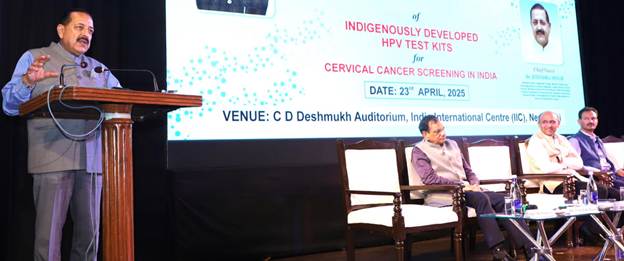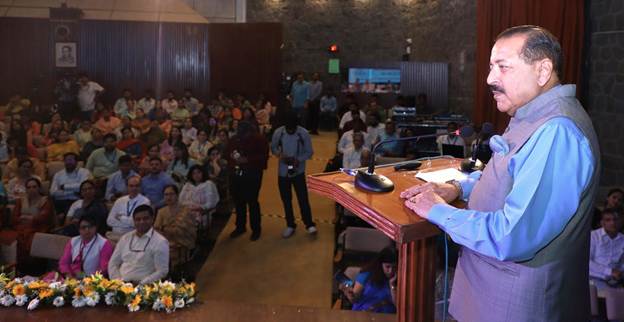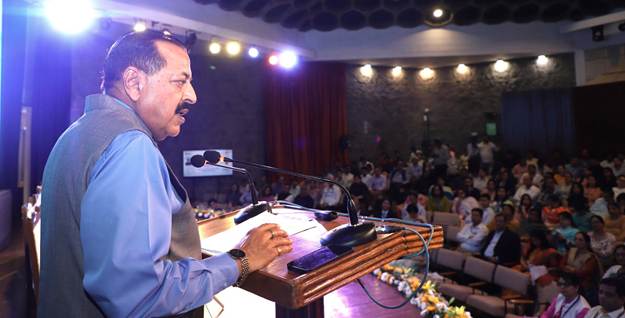Ministry of Science & Technology
Union Minister Dr. Jitendra Singh convenes a joint meeting of Department of Biotechnology, AIIMS New Delhi, BIRAC, ICMR and Industry partners to review the indigenously developed HPV test kits for Cervical Cancer screening in India Calls Scientific Review of Indigenously Developed HPV Test Kits for Cervical Cancer Screening,
Describes it as a Milestone in Preventive Healthcare:
With 1 in every 5 women globally suffering from cervical cancer is from India. With 25% of global cervical cancer deaths occurring in India— often due to late diagnosis— Dr. Jitendra Singh stresses the critical need for preventive screening strategies
Lauds involvement of the private sector is integral to these success stories, highlighting a "whole-of-science and whole-of-government approach."
Ultimate objective is to enable affordable, accessible, and ideally mass screening for cervical cancer highlights Dr. Jitendra Singh
Dr. Jitendra Singh calls it national responsibility to safeguard our youth and offer them timely prevention of metabolic disorders
प्रविष्टि तिथि:
23 APR 2025 5:13PM by PIB Delhi
Union Minister of State (Independent Charge) for Science and Technology, Minister of State (Independent Charge) for Earth Sciences, MoS PMO, Department of Atomic Energy and Department of Space, MoS Personnel, Public Grievances and Pensions, Dr. Jitendra Singh today convened a joint meeting of Department of Biotechnology, AIIMS New Delhi, BIRAC, ICMR and Industry partners here to review the indigenously developed HPV test kits for Cervical Cancer screening in India and described it as another milestone in preventive healthcare achieved by the Department of Biotechnology (DBT) under the Ministry of Science & Technology.
Dr. Jitendra Singh emphasized that the ultimate goal is to position India as a global leader in preventive healthcare. He said it is now the right time to acknowledge a series of significant milestones accomplished by the team at DBT and BIRAC, including the development of the first-ever DNA vaccine, which brought India international recognition and restored esteem to Indian science in the field of healthcare.
"The DNA vaccine has projected India as a country capable of leading in preventive healthcare—a stark contrast to the outdated perception that India neither prioritized preventive, nor even curative healthcare,” said Dr. Jitendra Singh.

He also referred to Nafithromycin, India’s first indigenous antibiotic, which has received encouraging feedback. Dr. Jitendra Singh reiterated that the involvement of the private sector is integral to these success stories, highlighting a "whole-of-science and whole-of-government approach."
Another breakthrough cited was the successful gene therapy trial in hemophilia, which earned a spot in the prestigious New England Journal of Medicine (NEJM). Notably, both the British Medical Journal and NEJM, among the world’s oldest medical journals, have acknowledged India’s pioneering healthcare research.
Dr. Jitendra Singh outlined four pillars of focus namely 1. Preventive Healthcare – As the future of healthcare lies in prevention, this will be the government's primary focus moving forward.2. Youth-Centric Preventive Measures – Recognizing the prevalence of cervical cancer among adolescents and young women, emphasis will be on early-age interventions.3. Women’s Health –Strengthening government initiatives across ministries, including Health and Women & Child Development. 4. Private Sector Involvement – Building an ecosystem where government and private players collaborate domestically and globally.
Dr. Jitendra Singh coined the term “PPP plus PPP”, referring to Public-Private Partnerships both within and beyond national borders, a model successfully adopted by several European nations, particularly in life sciences and healthcare.

Dr. Jitendra Singh drew attention to India ranking fourth globally in cervical cancer-related morbidity, underscoring the urgent need for action. He cautioned, however, that HPV is not the sole cause of cervical cancer, but studies have shown a 90% correlation, supporting the case for targeted prevention.
The Minister said that the ultimate objective is to enable affordable, accessible, and ideally mass screening for cervical cancer. He cited his own example from 1996 of providing free insulin treatment for Type 1 diabetes through charitable collaboration with Novo Nordisk, illustrating how private companies can contribute meaningfully.
Dr. Jitendra Singh also remarked that discussions around vaccines have surged post-COVID, but emphasized the need for holistic prevention, including social, cultural, and hygienic habits—the traditional pillars of public health education.
The GCI-BIRAC-DBT program titled “Validating Indigenous Human Papilloma Virus (HPV) Tests for Cervical Cancer Screening in India” successfully validated rapid, point-of-care, RT-PCR-based HPV diagnostic test kits. These kits were tested at premier R&D laboratories across the country.
According to WHO data, 1 in every 5 women globally suffering from cervical cancer is from India. With 25% of global cervical cancer deaths occurring in India—often due to late diagnosis—Dr. Jitendra Singh stressed the critical need for preventive screening strategies.
The Minister pointed out that current screening methods, including VIA/VILI, Pap smears, and HPV DNA testing, are costly, resource-intensive, and moderately sensitive. The new indigenous kits are expected to significantly reduce the cost and improve accessibility for widespread use.

Tying the initiative to Prime Minister Narendra Modi’s vision of Viksit Bharat 2047, Dr. Jitendra Singh said India is now addressing multiple challenges simultaneously. With over 70% of India’s population below the age of 40, Dr. Singh raised concerns about rising non-communicable diseases, including early-onset Type 2 diabetes, once considered a disease of the middle-aged.
“It becomes a national responsibility to safeguard our youth and offer them timely prevention if we truly aim to harness their energy for building the India of 2047,” Dr. Jitendra Singh asserted.
The Minister concluded by urging continued cross-sector collaboration to ensure that the benefits of science reach the common public, making healthcare not just accessible, but affordable and proactive.
The review meeting was attended by several key dignitaries and domain experts. Dr. V.K. Paul, Member, NITI Aayog; Dr. Rajesh Gokhale, Secretary, Department of Biotechnology (DBT); Jitendra Kumar, Managing Director, BIRAC; and Padma Shri Dr. Neerja Bhatla, a renowned expert in gynecologic oncology, were present and contributed valuable insights to the review proceedings.
Prior to the commencement of the scientific review, a two-minute silence was observed to pay solemn tribute to the lives lost in yesterday's terror attack in Pahalgam. The gathering expressed deep condolences and solidarity with the families of the victims.
***
NKR/PSM
(रिलीज़ आईडी: 2123856)
आगंतुक पटल : 1308